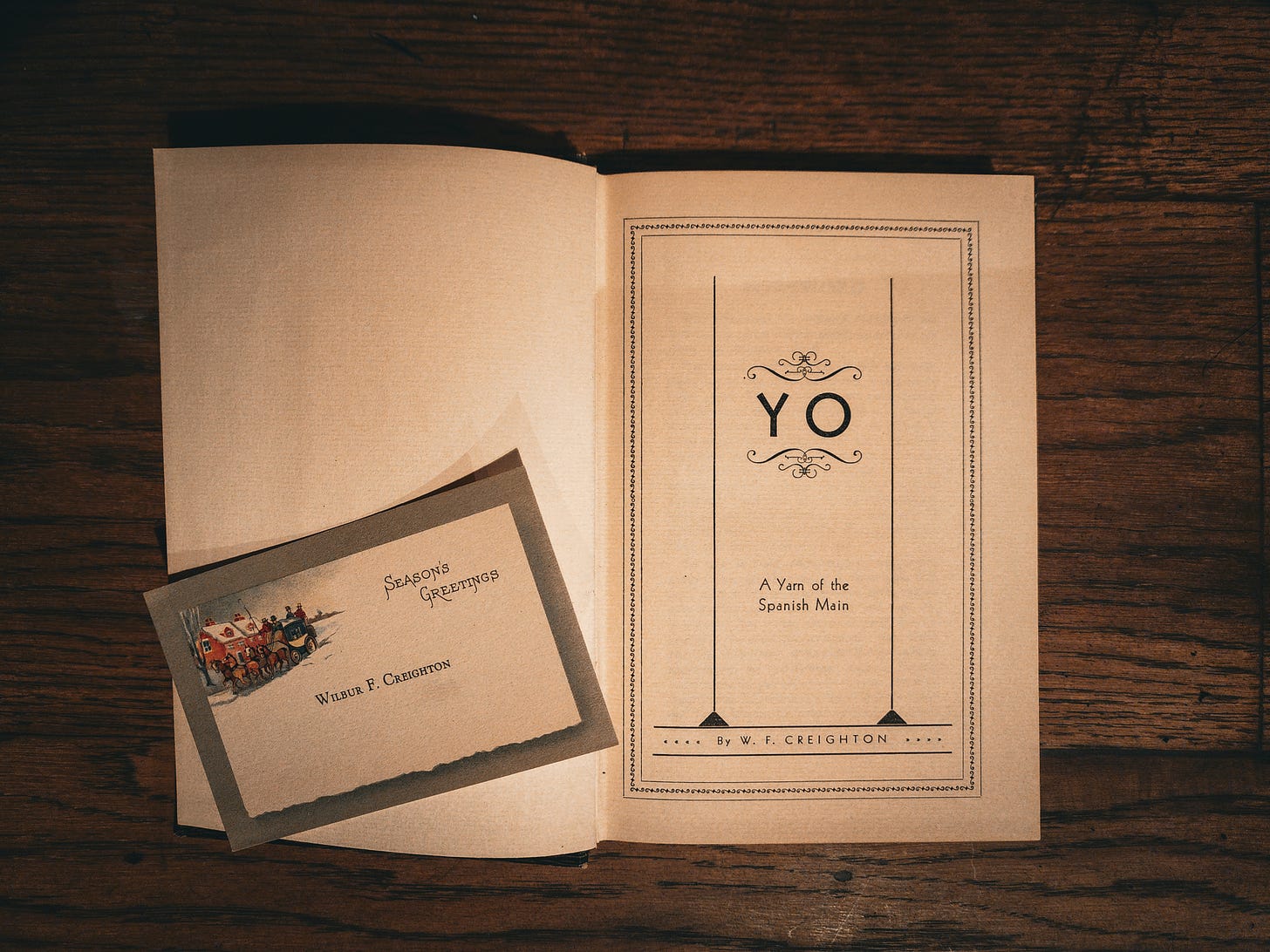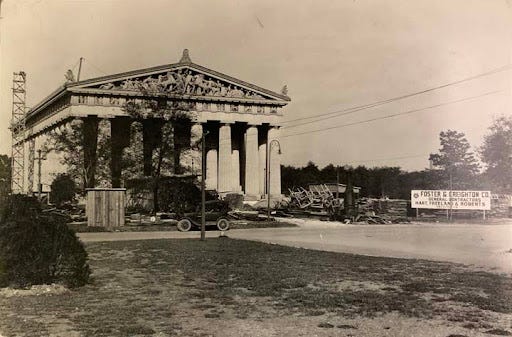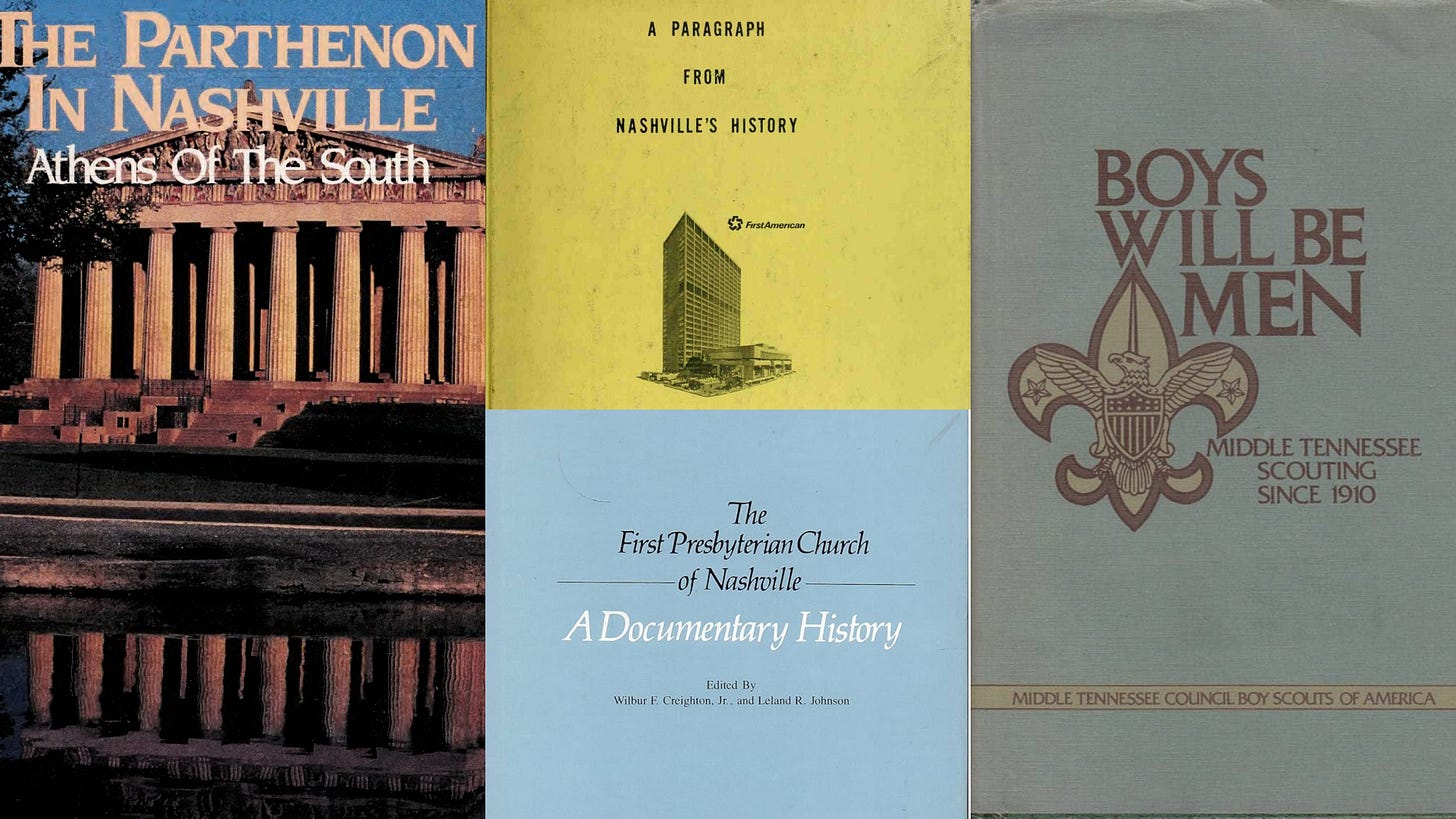From the Shelves: A Yarn of Nashville Lore
A Donald Davidson Deepcut
“Mr. Creighton’s book, I daresay, could not have come out of Zenith, home of the late George F. Babbitt or anywhere in the Middle West or the industrialized East. Most likely, it could only come from the South. For we Southerners love to remember, to preserve. To pass on the things we treasure. Possible there is an egotism about writing up one’s travels; but among us it is an egotism that is related to our individualism and therefore very precious, and to the spirit of conservatism that makes us stand by what we cherish.” - Donald Davidson
I’ve avoided cracking open Donald Davidson: An Essay and a Bibliography by Thomas Daniel Young and M. Thomas Inge, knowing it would ensnare me in countless hours of treasure hunting. And treasure doesn’t come cheap.
I opened it up the other day, with just one question in mind. Had Young and Inge overlooked a book? They did not. But in my search, I found and acquired an exceedingly rare Donald Davidson connected book: Yo: A Yarn of the Spanish Main by Wilbur Foster Creighton, privately printed in Nashville back in 1931.
Where does Davidson fit in all this? He wrote the Foreword for Yo, not the Preface as Young and Inge claimed.1 It appears Davidson’s bibliographers weren’t the only ones to err. If you collect anything bound or printed from Tennessee, Ronald R. Allen is likely a familiar name.2 Mr. Allen’s work was top shelf, yet it was mistitled as Yo: A Tale of the Spanish Main in his 2001 Library Development Review column “Some Interesting Tennessee Rarities in the Special Collections Library (exerpt below).”3
Some Tennessee Rarities, issued in 1973, included a selective listing of fifty rare Tennessee books. At that time, original editions of seventeen of those books were at the Special Collection Library at the University of Tennesee. Since then, ten additional titles on that list have been acquired by the library. Other than possibly the Library of Congress, the UT Library today probably holds more original editions of titles listed in Some Tennessee Rarities than any other library.
Since 1973, circumstances have evolved that necessitate a new look at rare printed Tennesseana. A number of previously unknown and significant books have surfaced. The term rarity has taken on an entirely new meaning, partly due to renewed interest in rare books in general, but likewise because of inflation. The minimum monetary value for inclusion in Some Tennessee Rarities was one hundred twenty-five dollars. While no claim was made nor intended that the books listed in that compilation represented “The” rarest Tennessee books, only a relatively small number of Tennessee books at that time were valued very much above that minimum amount—save those that were so rare as to be all but unobtainable, such as late eighteenth-century Tennessee imprints.
I am nearing completion of a new compilation, More Tennessee Rarities. Rather than listing a mere fifty Tennessee books, that compilation includes more than eight hundred additional titles, although the minimum arbitrarily selected monetary value for inclusion in this new book is two hundred fifty dollars—double the minimum value originally deemed necessary for inclusion in Some Tennessee Rarities in 1973. Original editions of a considerable number of books to be included in More Tennessee Rarities are on the shelves of the University of Tennessee's Special Collections Library. Here, I have listed a few of the interesting—and sometimes little known—such titles that are in Special Collections.
Creighton, Wilbur F. Yo. A Tale of the Spanish Main. No place. No date. [Nashville. circa 1931.] 190 pages. Plates (maps, and from photographs). Tale of a Caribbean trip with friends and family. The four page Introduction was written by Donald Davidson, dated Vanderbilt University, 1930. A scarce and little-known book, unrecorded in the National Union Catalog.
The rare bookseller that sold me the volume noted OCLC records show less than 10 copies are known to exist.4 In their research they never found a copy sold at auction and I’ve never across a copy before. Oh yeah, the one on my shelf was Donald Davidson’s personal copy.
So, who was Wilbur Foster Creighton and why would Davidson write the Foreword to his privately printed Caribbean vacation travelogue?
Wilbur Foster Creighton, Jr. [1906-2004], a son of Nashville, graduated from Vanderbilt University in 1929 with a degree in Engineering. Like his father before him, he was a member of Sigma Chi Fraternity. His family's firm, Foster & Creighton, had been shaping Nashville since 1885, raising structures on the Vanderbilt campus and throughout the city, including the grand replica of the Parthenon for the 1897 Tennessee Centennial Exposition.5
The Creightons are virtually Nashville royalty, and I've always been intrigued by Middle Tennessee's aristocracy. W.F. Creighton Jr. calls to mind Ridley Wills II, both men of high birth who penned multiple volumes on Nashville's past. I’ve never mixed with the philanthropist class, but at 14 or 15, I was the lone worker in a humble upholstery shop. We reupholstered furniture in the Frist’s poolhouse.
The bookseller described the book as a “Splendid travel biography from a well-known Vanderbilt grad and personal friend of many Fugitive poets.” There are very few mentions of the book but after sniffing around a bit, I found a review in The Vanderbilt Alumnus:6
Readers of the Nashville Tennessean have expressed very strong regret that the Book Page, so ably conducted by Donald Davidson, has been discontinued. Begun in the Tennessean about seven years ago, the page was later syndicated to other Southern papers. Its prestige was considerable . . .
Mr. Davidson, by the way, writes a characteristic introduction to. Mr. Wilbur F. Creighton’s Yo, a Yarn of the Spanish Main. The foreword takes its stand with satisfaction that this travel book is “at healthy variance with the modern spirit”—it “could not have come out of Zenith, home of the late George F. Babbitt . . . most likely it could only come from the South.”
The book is all that Mr. Davidson’s delightful little introductory essay says it is. “Yo,” be it known, is the Spanish word for the pronoun “I.” And having labeled his book thus, the author is free to make whatever comments occur to him. The result is no ordinary travel book, but a pleasant of things seen and done and enjoyed to the utmost. Personal accounts of friends and family, amusing comments on Latin are included along with bits of history, descriptions of ports visited, and such other items as might be expected from a keen-eyed builder and engineer. The volume was written as a sort of diary during a Caribbean cruise. Photographs and maps add to its attractiveness.
Creighton’s time at Vanderbilt overlaps with Davidson’s work on I’ll Take My Stand, published one month after Davidson wrote the Foreword for Creighton. I also found that in 1930/1931, Davidson donated an original manuscript of The Tall Men to the Tennessee State Library, and Creighton donated a copy of Yo.7 I could go on sharing stories and connections between Davidson and Creighton, but I'll finish with Davidson’s Foreword, which might be the only place he discusses his thoughts on travel.8
What I like about Mr. Wilbur F. Creighton’s fine little book is that it is quite against the trend of the times. Let me explain myself.
People travel much nowadays. At least they jostle about in a nervous, disconnected way, if that can be called travel. Their journeying has no particular meaning and possibly little real pleasure in it, because it is undertaken superficially and has no relation to a firm center of personality within, that is capable of consistency even while it enlarges under the impact of fresh experience. If one's personality is only so much quaking jelly to begin with, how can travel do any good? Travel then may become only a fidgety moving about, which will produce an affectation of culture but not in any way civilize. Among Americans, I fear, most travel is just of this sort.
Yet what an ironic contradiction for our extravagantly mobile age! The means of travel are easier than ever before in history; they are accessible to millionaires and hitch-hikers alike, by air, land, and sea. It is strange that we get less out of travel than our forebears, who undertook journeys after great debate and then went about incommodiously, by crawling stage-coaches and paddle-wheel steamers. Possibly travel is now too easy to be really valuable. The savor departs from the thing that takes so little trouble to get. Travel becomes like popular education, which is now cheapened into an ordinary commodity and is enforced on every Tom, Dick, and Harry by hurried mechanical processes, and in heaping doses. It is then no longer precious and has hardly any effect on the commonwealth except to make the natural silliness of the human animal even more excruciating.
Mr. Creighton’s narrative is subject to none of these indictments. It is interesting, It is valuable, it is remarkable because it is at healthy variance with the modern spirit that I have described.
A Caribbean tour, in the first place, is not a conventional tour; and Mr. Creighton did not go on it in the conventional spirit. Perhaps he wanted to improve his Spanish, or to try it out; but certainly the itch for “culture” which drives hordes of American tourists from museum to museum, to the great annoyance and profit of the Europeans, was not among his motives. He wanted to relax and enjoy himself with family and friends among new surroundings. He took his time, and he enjoyed every moment for what it was worth; but, having a reflective bent, he used his opportunities to turn over leisurely in his mind whatever he saw, and to compare it with any preconceptions he may have had.
The empty–minded person, who simply reacts to surface stimuli, could never attain such a nice balance of enjoyment with observation and reflection. Mr. Creighton could. He was a self-contained personality, with an inquiring yet independent mind, a well-developed interest in Latin-America, a professional eye for buildings and engineering works, before he ever started his trip. That is to say, he was infinitely more than the average tourist, who, because he is nothing to begin with, must alternate between shallow thrills and complacent boredom.
Mr. Creighton has the ideal spirit for traveling. You can see the marks of it in what he writes and in his manner of writing. Take his comparisons, for instance, at which he is very ready: New Orleans, with San Francisco and New York—with his apt phrases for each; or his mental notes on the similarity between Jamaican negroes and our Southern ones. Navigation interests him, the mouth of the Mississippi attracts him,—and not merely the ship's bar. He can smile over his own notions as well as his companions’ antics. He sizes up people just as shrewdly as he notes the character of the places he visits. His occasional character sketches are always clear, penetrating, tolerant—never acidulous.
And I particularly rejoice in his reflections on prohibition, on religion, on the technique of the old-fashioned girl and the flapper. In all these is the fibre of a strong common-sense, mixed with calm good-humor, that gives the book its character. The same common-sense, I think, endows him with a pithy, easy style that always goes straight to its mark without the literary fuss-and-feathers that often makes “unprofessional” writers perform too ponderously. Mr. Creighton, too, has a sense of form that probably comes from his training as an engineer.
But I am most interested in inquiring why Mr. Creighton wrote a book at all. He did so, I imagine, because he wished to retain and taste over again his experience and to pass on the valuable part of it to family and friends. Here again is an un-modern impulse—utterly contrary to the prevalent American tendencies.
Mr. Creighton’s book, I daresay, could not have come out of Zenith, home of the late George F. Babbitt or anywhere in the Middle West or the industrialized East. Most likely, it could only come from the South. For we Southerners love to remember, to preserve. To pass on the things we treasure. Possible there is an egotism about writing up one’s travels; but among us it is an egotism that is related to our individualism and therefore very precious, and to the spirit of conservatism that makes us stand by what we cherish.
In the libraries now one may discover the travel books that our judges, doctors, planters, and men and women of letters used to write—books very valuable for historians, books with titles like Journal of a Visit to the So-and-So Country. These belong essentially to the Eighteenth Century tradition that the South inherited, and they link up with the old habit of letter-writing and diary-keeping. Mr. Creighton’s book belongs within this tradition, despite its modern subject-matter and its occasional colloquial freedom where his Eighteenth Century forebears might have put a little rhetorical starch. I recall, in this connection, that Mr. Creighton mentions both Samuel Pepys. and Thornton Wilder in the course of his narrative—the former rather approvingly, the latter not so approvingly. It gives me great pleasure to reflect that he himself is fortunately much nearer in spirit to Pepys than to Wilder, and, being such, has been able to give us, in his own delightful way, the full flavor of a pleasant journey and of the person that he is.
Donald Davidson
Vanderbilt University
October 27, 1930.
Related:
Young, Thomas Daniel., Inge, M. Thomas. Donald Davidson: An Essay and a Bibliography. Nashville: Vanderbilt University Press, 1965. p. 83.
“Ron was a rare book dealer and well known local historian who composed nearly 30 books, many of which detailed Knoxville’s history, memories, and events. He was a member of East Tennessee Historical Society, The Tennessee Society, an avid contributor and supporter of the UTK libraries.” source
Some of his work:
Tennessee Imprints: 1791-1875
Tennesseana: A Value Guide to Scarce and Rare Books
Some Tennessee Rarities
More Tennessee Rarities
It’s plausible the error wasn’t Allen’s and was the publication’s fault, etc. Lloyd, James. Leonard, Susan (eds). The Library Development Review. Knoxville: University of Tennessee, 2000/2001. p. 11.
There are copies at:
Birmingham, Alabama Public Library (1 copy)
University of Tennessee Rare Books Special Collections (1 copy)
Tennessee State Library & Archives (1 copy)
Vanderbilt University Special Collections (1 copy. Stanley F. Horn’s copy)
University of Memphis Special Collections (1 copy)
University of Iowa Special Collections (1 copy. Library's copy (Stein Collection) inscribed: "For the Bishops & Steins, good companions on a pleasant trip. W.F. Creighton, Nashville, Tenn. April 1931.)
University of Virginia
Interesting considering Davidson’s poem “On A Replica Of The Parthenon.”
Wilbur F. Creighton, Jr. Collection Biographical Note
Foster & Creighton Wiki, Construction Sites
Oral history interview with Wilbur Foster Creighton, Jr. and the Nashville Public Library Digital Collection
Smith, Mapheus. Vanderbilt Alumnus 16.4, “Vanderbilt Books and Authors”, Feburary 1931, p. 96.
Tennessee. Department of Education., Tennessee. Department of Public Instruction. Annual report of the Department of Education. [Nashville]: Tennessee Dept. of Education.
No clue if accurate but don’t remember reading anything by him on the subject.







